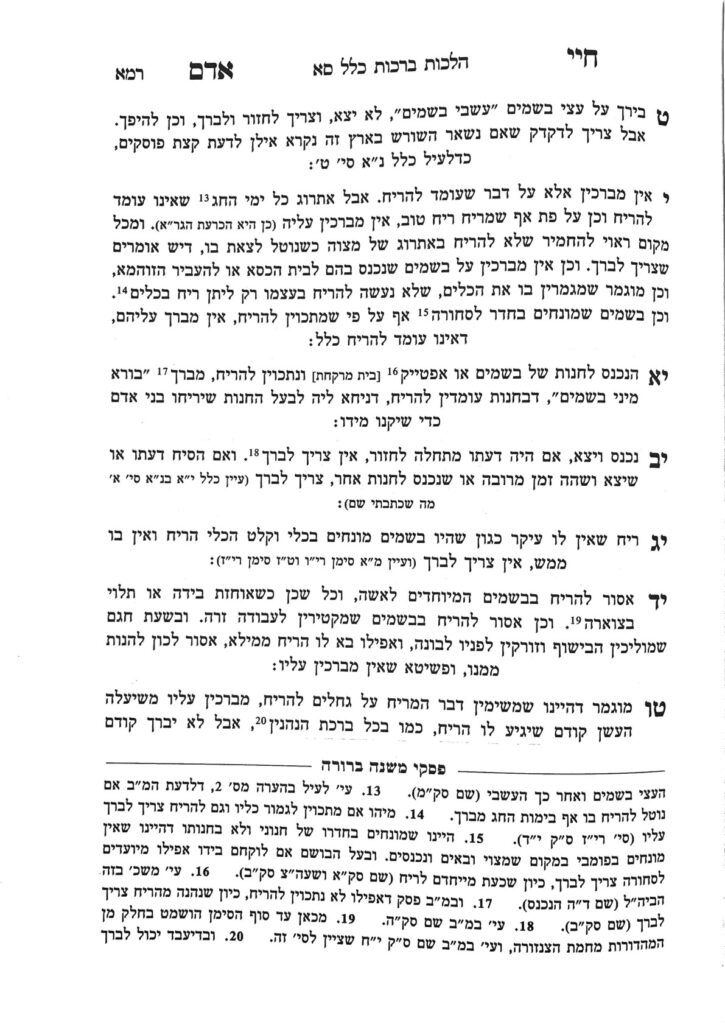We are continuing in siman 12. The Chayei Adam wrote that if one remains away from a perfumery for a “long time”, they would need to make a new bracha. We learned about the definition of a “long time”, comparing our case to the case of taking off a tallis, and concluded that one would not make a new bracha for up to three hours after leaving, provided they did not effect a hesech hadaas (i.e., a deliberate decision to end).
The halacha of remaining away for an amount of time applies to the halachos of sukkos as well. If one leaves the sukkah with the intent to return, even if they delay in returning (e.g., guests come to the door, etc.) they do not make a new bracha for up to three hours after having left the sukkah, provided they did not effect an intentional hesech hadaas from the sukkah.
We learned from Rav Moshe Shternbuch that lechatchilla, a “long time” refers to more than 30 minutes,. The shiur of three hours was due to a safeik, and the halacha of safeik brachos l’hakeil. Thus, lechatchilla, if one leaves the sukkah with intent to return, one should not remain out of the sukkah for more than 30 minutes in order to avoid the situation.
In all three of these cases, the question of shinui makom must be considered as well. Regarding tallis, the question is usually not relevant, because one generally remains in the same makom. Regarding smells, we learned (shiur 1186) two reasons why shinui makom would not necessitate a new bracha. Regarding sukkah, the reason that shinui makom does not necessitate a new bracha for smells (because no action is required) applies to sukkah as well.
However, the question of shinui makom may be dependent on a machlokes between the Rosh and Rambam. The bracha we make on the sukkah is lei’sheiv basukkah. The Rosh holds that lei’sheiv does not literally mean to sit, but to dwell and spend time in a place. Once a person walks into the sukkah, they have fulfilled the mitzvah, and no further action is required on their part to fulfil the mitzvah, exactly as the Magen Avraham described the bracha on smell.
The Rambam disagrees and holds that the bracha refers to specifically sitting down, and a person has not fulfilled their mitzvah until they have sat down.
This machlokes plays out in an interesting discussion about how to make the bracha. According to the Rosh, once a person has entered the sukkah, they have immediately fulfilled their mitzvah. Thus, one could argue that the bracha should be made right before walking into the sukkah, in order to make the bracha immediately before fulfilling the mitzvah. Nevertheless, Chazal established that one should make the bracha lei’sheiv basukkah during kiddush. Therefore, since one fulfils the mitzvah of sukkah in any manner, if one has the minhag to sit for kiddush, they may remain seated for the bracha, because they do not need to follow the bracha with an action (sitting down) in order to fulfil the mitzvah.
According to the Rambam, since the mitzvah is to sit, one should stand during the bracha in order to sit immediately afterwards and fulfil their mitzvah, as one normally proceeds to act on the mitzvah right after making the bracha.
Regarding shinui makom, according to the Rambam, since one has to do an action in order to fulfil the mitzvah (sitting), a sukkah is not akin to a perfumery (where the smell comes to a person without any action), but rather more similar to food (where an action is necessary to receive the benefit). If so, when one leaves, even if they intend to return, they would need to make a new bracha.
However, the assumption of the poskim is to follow the Rosh, so one would not make a new bracha upon their return, provided they did not effect a hesech hadaas.
I will be giving a full length shiur on this topic, at the yeshiva,on the first day of chol hamoed, BE”H.
Summary
- If one makes a bracha on smell, the bracha will extend for as long as they remain in that makom.
- There are three situations in which one would require a new bracha:
- If one effects a hesech hadaas on the smell. A hesech hadaas is defined as an active decision to no longer smell the item or to return to the store.
- If one left the store with the intent to return, and later changed their mind, they have also effected a hesech hadaas and would require a new bracha should they return.
- If one did not have any particular intent but remained away for a long time. A long time is defined as more than three hours.
- If one effects a hesech hadaas on the smell. A hesech hadaas is defined as an active decision to no longer smell the item or to return to the store.
The above halachos apply to sukkah as there. Therefore:
- If one makes a bracha on the sukkah, the bracha will extend for as long as they remain in that sukkah.
- There are three situations in which one would require a new bracha:
- If one effects a hesech hadaas on the sukkah. A hesech hadaas is defined as an active decision to leave the sukkah or not to return to it.
- If one left the sukkah with the intent to return, and later changed their mind, they have also effected a hesech hadaas and would require a new bracha should they return.
- If one did not have any particular intent but remained away for a long time. A long time is defined as more than three hours.
- If one effects a hesech hadaas on the sukkah. A hesech hadaas is defined as an active decision to leave the sukkah or not to return to it.



